Previous FI Curriculum – Ch. 3
faire ‘to do, to make’
The verb faire is irregular in the present tense.
| faire ‘to do, to make’ | |
| je fais | nous faisons |
| tu fais | vous faites |
| il/elle/on fait | ils/elles font |
| past participle : fait | |
Note the vous form faites. It is unusual because it does not end in -ez. Faire is one of only three verbs where this is the case (The others are être: vous êtes, and dire: vous dites ). You may notice, too, the similarity in the third person plural forms of aller, être, and faire:
- ils vont (they go),
- ils sont (they are), and
- ils font (they do/make).
Listen carefully to the following sentences. Although faire is often used in a question, it does not automatically have to be used in the response.
| Tex: Salut tout le monde. Qu’est-ce qu’on fait? | Tex: Hey everyone. What’s everybody doing? |
| Corey: Pas grand-chose. | Corey: Not much. |
| Fiona: Nous ne faisons rien, absolument rien. | Fiona: We’re not doing anything, absolutely nothing. |

Faire is used in many expressions, including weather, sports, and household tasks.
Listening Comprehension:
1
2
3
4
5
6
7
8
9
10
11
12
faire expressions
The verb faire is used in many impersonal weather expressions.
| Quel temps fait-il? | What’s the weather like? |
| Il fait beau. | It’s beautiful. |
| Il fait chaud. | It’s hot. |
| Il fait du brouillard. | It’s foggy. |
| Il fait du soleil. | It’s sunny. |
| Il fait du vent. | It’s windy. |
| Il fait frais. | It’s cool. |
| Il fait froid. | It’s cold. |
| Il fait mauvais. | It’s bad. |

Other weather expressions which do not use faire include:
| Il y a des nuages. | It’s cloudy. |
| Il y a des orages. | There are storms. |
| Il y a de l’orage. | It’s stormy. |
| Il pleut. | It’s raining. |
| Il neige. | It’s snowing. |
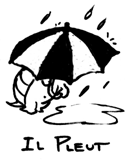 Faire is also used to talk about sports and leisure activities. Here is a list of common expressions.
Faire is also used to talk about sports and leisure activities. Here is a list of common expressions.
| faire de la bicyclette | to go bicycle riding |
| faire du bateau | to go boating |
| faire de la lecture | to read |
| faire de la planche à voile | to go windsurfing |
| faire des randonnées | to go hiking |
| faire du ski | to go skiing |
| faire du vélo | to go bicycle riding, cycling |
| faire de la voile | to go sailing |
| faire une promenade | to take a walk |
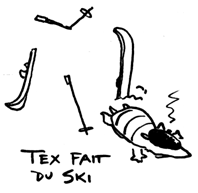
Faire is also used in many expressions dealing with household chores.
| faire des achats (du shopping) | to go shopping |
| faire la cuisine | to do the cooking |
| faire des courses | to run errands |
| faire la lessive | to do the laundry |
| faire le lit | to make the bed |
| faire le marché | to do the grocery shopping |
| faire le ménage | to do the housework |
| faire la vaisselle | to do the dishes |
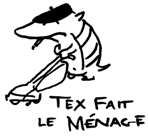
| Quand il fait du soleil, Tex et Tammy font une promenade dans le parc. | When it’s sunny, Tex and Tammy take a walk in the park. | |
| Quand il fait mauvais, Tex fait le ménage et Tammy fait de la lecture. | When the weather’s bad, Tex does the housework and Tammy reads. |
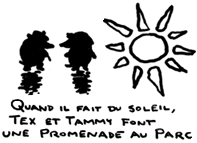
-ir verbs (irregular) partir, sortir, and dormir
The verbs partir, sortir, and dormir are irregular in the present tense, that is, they are not conjugated like regular -ir verbs. Listen carefully to the pronunciation of these verbs, noting especially the pronunciation of the consonant sound in the plural forms. Can you hear the difference between the singular and the plural forms in the third person?
| partir ‘to leave’ | |
| je pars | nous partons |
| tu pars | vous partez |
| il/elle/on part | ils/elles partent |
| past participle : parti | |
| sortir ‘to exit, go out’ | |
| je sors | nous sortons |
| tu sors | vous sortez |
| il/elle/on sort | ils/elles sortent |
| past participle : sorti | |
| dormir ‘to sleep’ | |
| je dors | nous dormons |
| tu dors | vous dormez |
| il/elle/on dort | ils/elles dorment |
| past participle: dormi | |
| Bette: Tammy, tu pars ce week-end? | Bette: Tammy, are you leaving this weekend? | |
| Tammy: Oui, je pars pour la Louisiane avec Tex. Nous allons rendre visite à Paw-Paw. Samedi soir nous sortons danser et manger de la cuisine cadienne. | Tammy: Yes, I’m going to Louisianna with Tex. We’re going to visit Paw-Paw. We’re going out Saturday night to dance and eat some Cajun food. | |
| Bette: Et Paw-Paw, il sort avec vous? | Bette: And does Paw-Paw go out with you? | |
| Tammy: Non, il préfère rester à la maison pour dormir. | Tammy: No, he prefers to stay at home and sleep. |
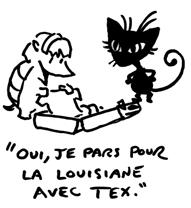
Listening Comprehension
1
2
3
4
5
6
7
8
9
10
11
12
-er verbs (stem changing) present tense
Spelling changes occur in the stems of several groups of -er verbs in the present tense. These spelling changes reflect the pronunciation of the present tense forms.
You may have already noticed the spelling change in the verb s’appeler (Je m’appelle …, My name is …). For verbs like appeler (to call), rappeler (to call back) and jeter (to throw), the consonant -l or -t in the the stem doubles in all forms of the present tense, except in the first and second person plural (nous and vous). This follows the traditional boot pattern of -er verb conjugations in the present tense.
| appeler ‘to call’ | |
| j’appelle | nous appelons |
| tu appelles | vous appelez |
| il/elle/on appelle | ils/elles appellent |
| past participle : appelé | |
This same “boot” pattern is repeated in spelling change verbs like préférer (to prefer). In these verbs the é in the last syllable of the stem changes to an è, except in the first and second person plural (nous and vous). Listen carefully to the different pronunciations of é and è in the conjugations below.
| préférer ‘to prefer’ | |
| je préfère | nous préférons |
| tu préfères | vous préférez |
| il/elle/on préfère | ils/elles préfèrent |
| past participle : préféré | |
Verbs conjugated like préférer include:
- considérer, to consider
- espérer, to hope
- régler, to regulate, pay, settle, adjust
- répéter,to repeat
- sécher, to dry, skip (a class)
In verbs which are conjugated like acheter (to buy), the e in the last syllable of the stem also changes to an è, again with the exception of the first and second person plural forms.
| acheter ‘to buy’ | |
| j’achète | nous achetons |
| tu achètes | vous achetez |
| il/elle/on achète | ils/elles achètent |
| past participle : acheté | |
Verbs conjugated like acheter include:
- amener, to bring somebody (along)
- emmener, to take somebody (along)
- lever, to lift, raise
- mener, to take, lead
- peser, to weigh
Another group of stem-changing verbs include those ending in –ayer, including essayer (to try) and payer (to pay). In these verbs the y changes to i in all persons except the first and second person plural (nous and vous).
| essayer ‘to try’ | |
| j’essaie | nous essayons |
| tu essaies | vous essayez |
| il/elle/on essaie | ils/elles essaient |
| past participle : essayé | |
Finally, verbs ending in -ger like voyager (to travel) add an e after the g in the nous form of the present tense, so that the g is pronounced as a soft sound before the –ons ending (i.e. nous voyageons). Similarly, in verbs ending in –cer, commencer (to start), for example, the c in the nous form changes to ç to keep the soft c sound (nous commençons).
| voyager ‘to travel | |
| je voyage | nous voyageons |
| tu voyages | vous voyagez |
| il/elle/on voyage | ils/elles voyagent |
| past participle: voyagé | |
Other verbs in this category include:
- corriger, to correct
- exiger, to demand, require
- manger, to eat
- nager, to swim
- partager, to share
- ranger, to tidy up, arrange
- rédiger, to write, compose
- songer, to dream, reflect

| Quelle activité est-ce que vous préférez en été? | What activity do you prefer in the summer? |
| Rita: J’emmène mes enfants à la piscine. | Rita: I take my children to the pool. |
| Ses enfants: Nous nageons et nous mangeons de la glace. | Her children: We swim and we eat ice cream. |
| Tammy: Moi, je préfère faire du shopping. J’achète beaucoup et papa paie tout. | Tammy: Me, I prefer shopping. I buy lots and daddy pays for everything. |
1
2
3
4
5
6
7
8
9
10
11
12
aller ‘to go’
The verb aller is irregular in the present tense. Listen carefully to the pronunciation of the -s in the plural forms nous and vous forms. This -s is pronounced as a /z/ to link with the vowel sound in the plural forms allons and allez.
| aller ‘to go’ | |
| je vais | nous allons |
| tu vas | vous allez |
| il/elle/on va | ils/elles vont |
| past participle : allé | |
Aller literally means ‘to go’, but is used figuratively in salutations to say how one is doing.
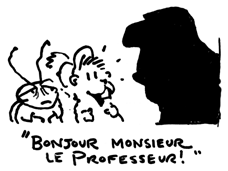
| Corey: Salut, Joe-Bob , où vas -tu? | Corey: Hey, Joe-Bob, where are you going? | |
| Joe-Bob: Je vais au café. | Joe-Bob: I’m going to a coffee shop. | |
| Corey: Mais, tu as cours maintenant. | Corey: But, you have class right now. | |
| Joe-Bob: Oui, mais le prof est horrible, vraiment horrible! | Joe-Bob: Yes but, the prof is horrible, really horrible. | |
| Corey: Attention! Il arrive! | Corey: Watch out! He’s coming! | |
| Joe-Bob: Ah, bonjour monsieur le professeur. Comment allez-vous aujourd’hui? | Joe-Bob: Oh, hello, professor. How are you today? |
Aller is also used to talk about the near future, what one is ‘going to do.’
Listening Comprehension:
1
2
3
4
5
6
7
8
9
10
11
12
futur proche
Formation
There are two future tenses in French, the simple future and the near future (le futur proche). The futur proche is usually translated into English as going + infinitive (e.g., going to eat, going to drink, going to talk). The futur proche is characteristic of spoken French but may be used in informal writing. It is formed with the verb aller (to go) conjugated in the present tense followed by an infinitive.
| nager ‘to swim’ | |
| je vais nager, I am going to swim | nous allons nager, we are going to swim |
| tu vas nager, you are going to swim | vous allez nager, you are going to swim |
| il, elle / on va nager, he, she (it) / one is going to swim | ils / elles vont nager, they are going to swim |
To negate the futur proche, place ne … pas around the conjugated form of aller: Je ne vais pas nager. (I am not going to swim).
| Corey: Je vais aller à Barton Springs. J’adore l’eau. Je vais nager. Tu viens avec moi, Bette? | Corey: I am going to go to Barton Springs. I love water. I am going to swim. Are you coming with me, Bette? | |
| Bette: Tu es fou! Il fait trop froid! Je ne vais pas nager! | Bette: Are you crazy? It is too cold! I am not going to swim! |
Uses
The futur proche is used to refer to most future events in informal conversation. For details on usage see future: usage.
| Corey: Tex! Tammy! Nous allons aller à Barton Springs. | Corey: Tex! Tammy! We are going to go to Barton Springs. | |
| Bette: Mais il y a de gros nuages gris, il va pleuvoir. | Bette: But there are big gray clouds. It’s going to rain. | |
| Corey: Chouette! Je vais nager sous la pluie. | Corey: Great! I am going to swim in the rain. |
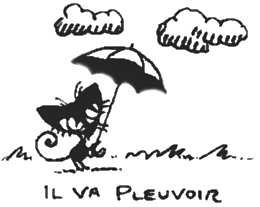
aller in the imperfect + infinitive
The construction aller + infinitive is also found with the verb aller in the imperfect (l’imparfait) to indicate what someone was going to do. For example:
| Les copains allaient partir pour Barton Springs, quand ils ont vu un éclair. | The friends were going to leave for Barton Springs, when they saw lightening. | |
| Bette: Corey, tu vas te faire électrocuter! Moi, je vais faire du shopping. Qui va venir avec moi? | Bette: Corey, you are going to get yourself electrocuted! I’m going to do some shopping. Who’s going to come with me? |
prepositions with places
Prepositions are used in expressions which relate where you are, where you are going and where you are coming from. The preposition used in such expressions depends on the geographic location discussed.

| geographic location | to/in | from |
| à | de (d’) | |
| cites (Paris, Londres, Austin) | à Paris | d’Austin |
| islands (Cuba, Tahiti) | à Cuba | de Tahiti |
| feminine (usually ending in -e) | en | de (d’) |
| countries (la France) | en France | de France |
| states (la Californie) | en Californie | de Californie |
| provinces (la Bourgogne) | en Bourgogne | de Bourgogne |
| continents (l’Europe) | en Europe | d’Europe |
| masculine | au | du |
| countries (le Canada, le Texas 🙂 | au Canada | du Texas |
| provinces/states (le Colorado) | au Colorado | du Colorado |
| masculine beginning with a vowel | en | de (d’) |
| countries (l’Iran) | en Iran | d’Iran |
| provinces/states (l’Ontario) | en Ontario | d’Ontario |
| aux | des | |
| plural countries and regions (les Etats-Unis) |
aux Etats-Unis | des Etats-Unis |
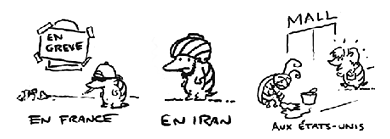
| Tex est né au Texas, bien sûr. Mais par accident il a grandi en Europe. Comment expliquer cette histoire incroyable? | Tex was born in Texas, of course, but by accident he grew up in Europe. How de we explain this unbelievable story? | |
| Eh bien, quand il était tout petit, on l’a mis dans un avion avec les bagages à l’aéroport Bush International à Houston. | Well, when he was very little, he was put with the luggage in a plane at Bush International Airport in Houston. | |
| Son avion est arrivé à Paris (en France) où il a rencontré des nonnes françaises qui venaient de faire un voyage aux Etats-Unis. Elles arrivaient de Houston, elles aussi. Quelle coïncidence! | His plane arrived in Paris (in France) where he met some French nuns who had just taken a trip to the United States. They, too, were arriving from Houston. What a coincidence! | |
| Elles ont eu pitié de ce pauvre tatou égaré et elles l’ont emmené au couvent à Lyon. Tex a vécu heureux chez les nonnes pendant plusieurs années. | They took pity on this poor lost armadillo and they took him to their convent in Lyon. Tex lived happily with the nuns for several years. | |
| Malheureusement, un jour il a été expulsé de France, et il est retourné dans son pays natal, c’est-à-dire au Texas! | Unfortunately, one day he was deported from France and he returned to his native country, that is, to Texas! |

